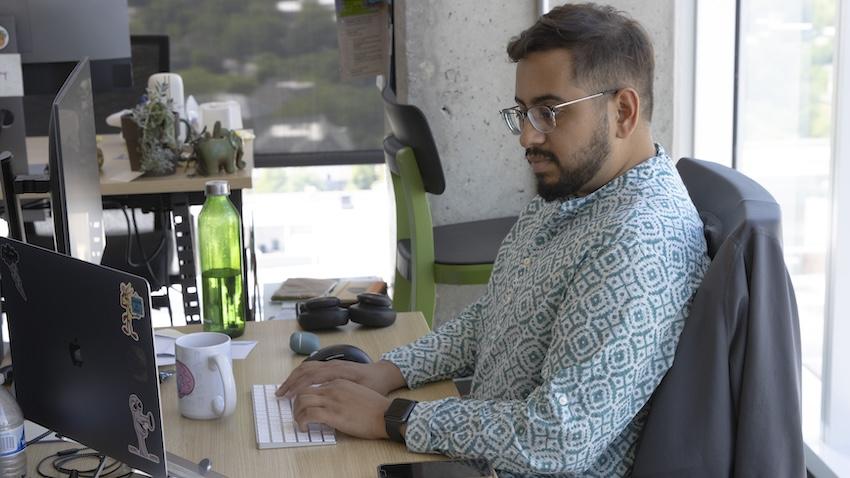
Graduating Ph.D. Student Looks to Improve Healthcare with Emerging AI Technologies
In some ways, Karthik Bhat didn’t come to Georgia Tech as much as Georgia Tech came to him.
It all began in his native India when he decided not to follow in his parents’ footsteps of becoming a doctor.
He was interested in healthcare, but he was also interested in technology. When he discovered human-computer interaction (HCI) and how technology can be applied to create better healthcare systems, he enrolled in the National Institute of Technology Karnataka in Surathkal, India.
After earning a bachelor’s in information technology, Bhat crossed paths with Michael Best. Best is currently the executive director of the Institute for People and Technology and a jointly appointed professor in the School of Interactive Computing and the Sam Nunn School of International Affairs.
Best joined Georgia Tech in 2004, but he took a leave of absence from 2015 to 2018 to become the founding director of the United Nations University Institute on Computing and Society in Macau SAR, China.
Bhat worked as a research assistant under Best. During that stint, he learned about the work of Best’s Georgia Tech colleague, Neha Kumar.
Kumar is an associate professor in the School of Interactive Computing. She is renowned for her research on the design and adoption of emerging technologies in diverse contexts with a focus on health and wellbeing.
“She was my top choice to do my Ph.D. with because I had seen the work she had been publishing,” Bhat said. “When I got the offer from Georgia Tech, there were no questions asked.”
Bhat started his Ph.D. in 2018. He is one of 25 graduate students from the School of Interactive Computing who will formally receive their Ph.D. at a commencement ceremony from 4 p.m. to 6 p.m. Thursday at McCamish Pavilion.
“It’s been a lot of growth for me at Georgia Tech,” he said. “The main thing for me is getting out of my comfort zone. I was in a space that allowed me to do the work I wanted, but it was a different culture. It’s been great to get that experience and to grow into my own here.”
Bhat added that his experience within American and Indian cultures has influenced his work.
He said, “I grew up in a family of doctors, and my research is on health in India, so I have that firsthand knowledge of how things function in that domain.
“How people approach technology in healthcare here is so different from what I’ve observed in India. You can spot these differences and find ways to bridge these gaps when you have an intimate knowledge of both spaces.”
Bhat struggled with imposter syndrome early on in his Ph.D. It became easier to manage when the first paper he authored as a Ph.D. student earned recognition at a prestigious conference.
Sociocultural Dimensions of Tracking Health and Taking Care won a best paper award at the 2020 Conference on Computer-Supported Cooperative Work and Social Computing (CSCW).
“I didn’t expect any awards,” he said. “When I got the award chair’s email, I couldn’t believe it was real. I had heard horror stories about computer glitches and paper submissions, so I was waiting for another email to tell me they had sent the first one by mistake.”
Bhat earned an honorable mention paper from CSCW in 2021 and has also authored or co-authored five papers accepted into the Conference on Human Factors in Computing Systems (CHI).
As a Ph.D. student, Bhat has designed new technologies and technology-aided workflows for telehealth. He’s researched the role emerging AI technologies could play in informal care environments. He’s also designing a chatbot that can handle automated tasks to reduce burdens on community health workers who moderate online health communities for maternal and child health.
In 2023, Bhat was named the sole Ph.D. student winner of the Foley Scholar Award, one of the highest honors given within Georgia Tech. The award honors graduate students who have made significant contributions to computing.
After graduation, Bhat will pursue a career in academia as a tenure-track faculty and pursue more HCI and AI-related work within healthcare and caregiving.
Top photo by Nathan Deen/College of Computing.
As computing revolutionizes research in science and engineering disciplines and drives industry innovation, Georgia Tech leads the way, ranking as a top-tier destination for undergraduate computer science (CS) education. Read more about the college's commitment:… https://t.co/9e5udNwuuD pic.twitter.com/MZ6KU9gpF3
— Georgia Tech Computing (@gtcomputing) September 24, 2024


